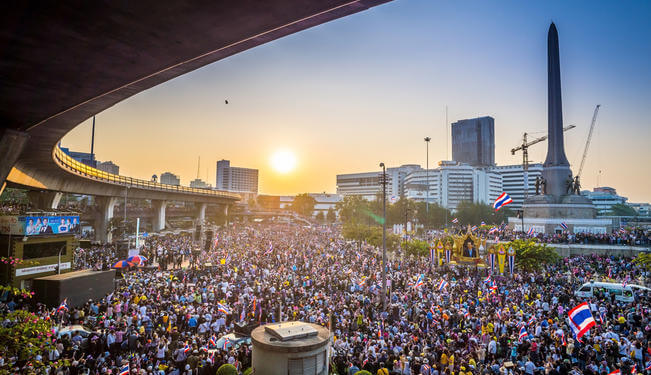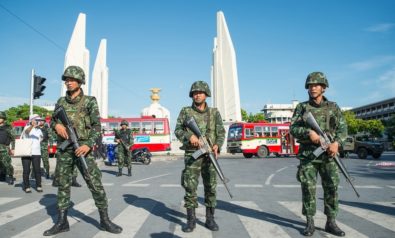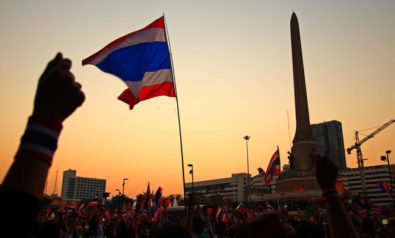Thailand’s political unrest is more than a showdown between “red shirts” and “yellow shirts.”
Background
In 2013, Thailand welcomed over 26.7 million visitors, while its capital city, Bangkok, was declared as the world’s number one travel destination by the Global Destination Cities Index.
Fast-forward to March 2014 and the current status of Bangkok as a tourist destination could not be more different.
While international media has recently focused on violent unrest in Ukraine and Venezuela, the fragile political situation in Thailand since November 2013 has also become increasingly violent. At least 24 people have died with hundreds injured in clashes between “yellow shirt” opposition forces, led by Suthep Thaugsuban — a deputy prime minister in the previous Abhisit Vejjajiva-led government — and pro-Thaksin “red shirts” who support Thailand’s first female prime minister, Yingluck Shinawatra.
Thailand has arguably had the most volatile history of democracy in Southeast Asia. Throughout the 20th century, the country witnessed over a dozen military interventions with the most recent being a bloodless coup in 2006, which saw the overthrow of Yingluck’s brother, former Prime Minister Thaksin Shinawatra.
Yingluck’s election victory in July 2011 led to Thailand enjoying relative stability and prosperity for a period of time. However, a failed attempt to pass a political amnesty bill in November 2013 — which would have overturned allegations against her brother on charges of corruption — triggered underlying tensions within Thai society in Bangkok over long-standing claims that she was merely a puppet of Thaksin, who lives in self-imposed exile.
Populist politics and growing unrest among the middle-classes in Bangkok in late 2013, which were triggered by her move on the political amnesty bill, led to Yingluck calling for elections on February 2, 2014. The election saw approximately 45.8% of voter participation — a far cry from the 75% who voted and elected Yingluck in 2011.
The recent vote has since been declared null and void by Thailand’s Constitutional Court, because voting did not take place in 28 constituencies where antigovernment protesters had prevented candidates from registering.
Why is Thailand’s Political Crisis Relevant?
As Southeast Asia’s second largest economy, the protests over the last five months have cost the Thai economy nearly 100 billion baht and have been detrimental to its formerly-booming tourism sector, which had expected to welcome 28 million international tourists in 2014.
At a deeper level, the current stalemate has only further polarized Thai society and deepened the divide between north and south Thailand. The antigovernment movement is greatly supported by urbanized middle-class citizens and established elites in southern Thailand. Yingluck’s base, however, comes from the rural northern and eastern parts of the country, who continue to support Thaksin’s populist politics.
In the context of Southeast Asia, political unrest in Thailand has done little to boost confidence among its neighbors in establishing the ASEAN Economic Community (AEC) by 2015.
The AEC has been projected to transform the region into one with free movement of goods, services, investment, skilled labor and a freer flow of capital. The uncertain political future of Thailand — a founding member of the Association of Southeast Asian Nations (ASEAN) — will inadvertently have an impact on the effectiveness of this integrative policy.
Given the historical forces that have allowed soft authoritarianism to establish a stronghold in Thailand, what happens at the country’s second general elections of 2014 is anyone’s guess.
Image: Copyright © Shutterstock. All Rights Reserved
For more than 10 years, Fair Observer has been free, fair and independent. No billionaire owns us, no advertisers control us. We are a reader-supported nonprofit. Unlike many other publications, we keep our content free for readers regardless of where they live or whether they can afford to pay. We have no paywalls and no ads.
In the post-truth era of fake news, echo chambers and filter bubbles, we publish a plurality of perspectives from around the world. Anyone can publish with us, but everyone goes through a rigorous editorial process. So, you get fact-checked, well-reasoned content instead of noise.
We publish 2,500+ voices from 90+ countries. We also conduct education and training programs on subjects ranging from digital media and journalism to writing and critical thinking. This doesn’t come cheap. Servers, editors, trainers and web developers cost money.
Please consider supporting us on a regular basis as a recurring donor or a sustaining member.
Support Fair Observer
We rely on your support for our independence, diversity and quality.
Will you support FO’s journalism?
We rely on your support for our independence, diversity and quality.







